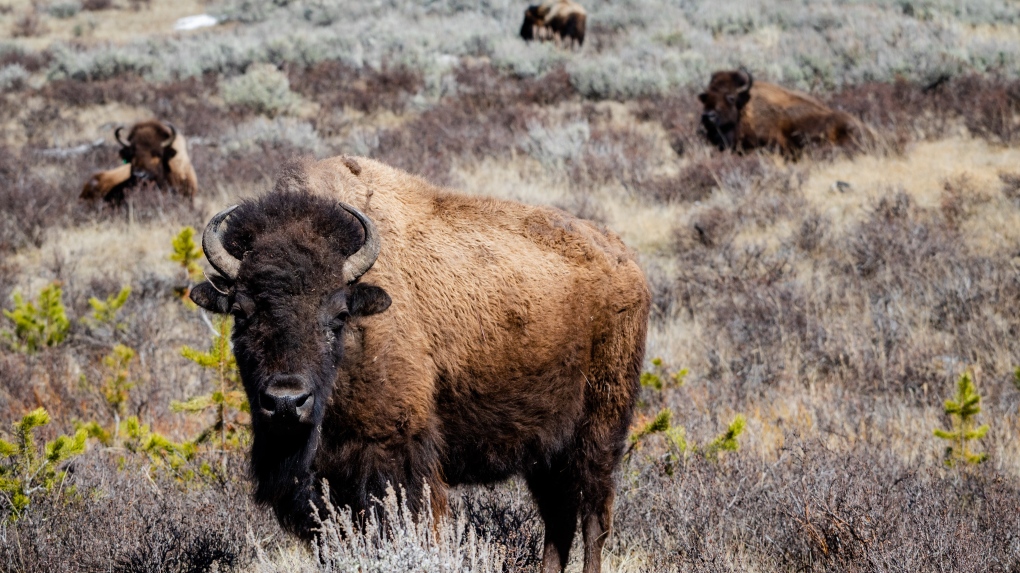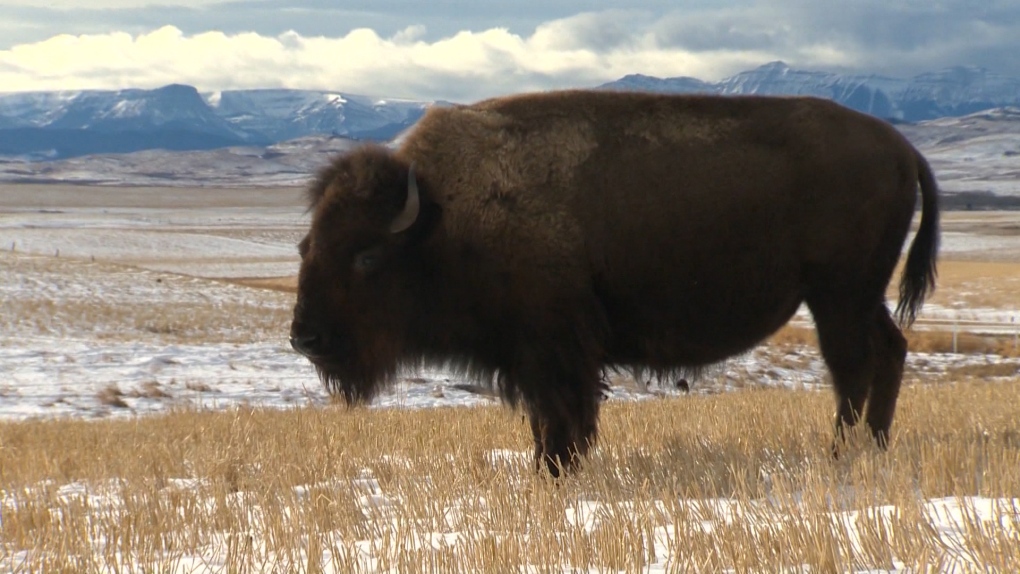Why aren't free-ranging bison classified as wildlife in Alberta?
Several wildlife and Indigenous groups are renewing calls for the provincial government to designate all free-ranging bison as wildlife under the Alberta Wildlife Act, as opposed to livestock.
The classification of bison in Alberta is complex and differs between regions, between plains and woods bison and between those in captivity and those that are free-ranging.
Outside of a few special regions in Alberta, free-ranging plains and wood buffalo are currently classified as livestock, which advocates argue creates confusion across different boundaries, makes it a challenge to effectively manage and protect herds and fails to recognize the animals' vital role in grassland and open boreal forest ecosystems.
"The problem is bison aren't really livestock, first of all. Bison are these wild animals right? They evolved here, they've been on the Great Plains for so long. They're these animals that have such connection to the ecosystem, they have connection to our history and Indigenous culture," said Ruiping Luo with the Alberta Wilderness Association.
"So first of all, it's an acknowledgment these are wild animals, these are not things you keep in pens, like cattle and what you think of when you think of livestock."
- Sign up for breaking news alerts from CTV News, right at your fingertips
- The information you need to know, sent directly to you: Download the CTV News App
The Alberta Wilderness Association is among six wildlife and environmental groups that penned an open letter to Alberta's Environment and Protected Areas Minister Rebecca Schulz, asking her to redesignate free-ranging bison in Alberta, as British Columbia and Saskatchewan have done.
"There is different regulations, there is different rules for how they can be handled, how they can be managed and how they can be protected. That creates a lot of confusion when you have this patchwork of areas where they're classified as wildlife and classified as livestock or treated that way at least. That makes it difficult to come up with things like management plans and if there are conflicts that arise, there are different expectations and approaches," Luo said.
Luo acknowledges progress has been made to protect and grow herds, like the plains bison reintroduction program in Banff National Park and certain First Nations, but outside parks and specific regions, the herds fall under a livestock classification, which she says puts them at risk.
"They can wander out into that buffer zone and they're still protected. The goal is to get them back into Banff and not see them killed. But, once they've left that boundary, potentially, they could be shot and in a lot of areas that is legal. It would be legal to kill a bison that wandered onto your private land," Luo said.
"In some cases, they fall under management as a pest species, so they can be removed or killed without too many repercussions."
Luo says the groups received a letter back from the minister but are disappointed it doesn't contain any commitments.
The letter says the status of plains bison in Alberta is being considered under the Wildlife Act, looking at "the potential need for managing the population's size and distribution, and possible disease transmission to or from livestock and people. In addition, excursions of free-roaming bison onto private lands requires deliberation. These are all significant issues that would be of interest to many Albertans."
A statement from the ministry on Thursday also reads:
"There are many ways to help support plains bison populations, and we are actively working to help sustainably grow Alberta's numbers. For example, we have been collaborating with Parks Canada on the reintroduction of Plains bison to Banff National Park, and plains bison are already listed as a subject animal within the 24,000-hectare protected Upper Red Deer Special Bison Area."

The government did recognize wild wood bison in northern Alberta as a protected species and gave them "threatened" status in 2021 under the Alberta Wildlife Act.
A step to reconciliation: Indigenous groups, scholars
Indigenous Peoples have a long history and connection with the buffalo and many groups support efforts to have the animals reclassified as wildlife.
Once numbering in the millions across North America, including Alberta, bison herds declined significantly after the arrival of European settlers and over-hunting, but have increased with the reintroduction of herds and there is a large population of farmed bison on ranches.
Katira Crow Shoe, director of education with the International Buffalo Relations Institute, says the return of bison promotes biodiversity, ecosystem resiliency and reconciliation.
"Buffalo and Indigenous people have always had a very strong relationship with each other and buffalo are in many historical stories with Indigenous people," Crow Shoe said.
"At that time, they were free-roaming and we had that ability to have that free-flowing relationship with them, so now, it's restricted to some extent with them not listed as wildlife."

Dr. Tasha Hubbard, a Cree associate professor in the Faculty of Native Studies and Film Studies at the University of Alberta, has a documentary coming in the fall called "Singing Back the Buffalo" and hopes it will have people question the way buffalo are treated in Alberta.
"Why are deer and moose and elk wildlife and why aren't buffalo? When we think of this continent and the myriad of beings that lived here and involved here and were a part of this land ... what I hope is people ask, 'Why are they not wild?'" Hubbard said.
"It's a physical sustainment in terms of how healthy it is for us to eat and consume and use all the parts, but it's also seeing them as beings that we have this spiritual and cultural connection to."
Alberta has several Indigenous-led repopulation projects, including on the Tsuut'ina Nation and Witchekan Lake First Nation.
CTVNews.ca Top Stories

Trump again calls to buy Greenland after eyeing Canada and the Panama Canal
First it was Canada, then the Panama Canal. Now, Donald Trump again wants Greenland. The president-elect is renewing unsuccessful calls he made during his first term for the U.S. to buy Greenland from Denmark, adding to the list of allied countries with which he's picking fights even before taking office on Jan. 20.
Multiple OnlyFans accounts featured suspected child sex abuse, investigator reports
An experienced child exploitation investigator told Reuters he reported 26 accounts on the popular adults-only website OnlyFans to authorities, saying they appeared to contain sexual content featuring underage teen girls.
King Charles ends royal warrants for Ben & Jerry's owner Unilever and Cadbury chocolatiers
King Charles III has ended royal warrants for Cadbury and Unilever, which owns brands including Marmite and Ben & Jerry’s, in a blow to the household names.
DEVELOPING Evacuation order issued for Edmonton building where security guard was killed
An apartment building where a security guard was killed earlier this month is being evacuated.
U.S. House Ethics report finds evidence Matt Gaetz paid thousands for sex and drugs including paying a 17-year-old for sex in 2017
The U.S. House Ethics Committee found evidence that former Rep. Matt Gaetz paid tens of thousands of dollars to women for sex or drugs on at least 20 occasions, including paying a 17-year-old girl for sex in 2017, according to a final draft of the panel's report on the Florida Republican, obtained by CNN.
Young mammoth remains found nearly intact in Siberian permafrost
Researchers in Siberia are conducting tests on a juvenile mammoth whose remarkably well-preserved remains were discovered in thawing permafrost after more than 50,000 years.
Ex-OpenAI engineer who raised legal concerns about the technology he helped build has died
Suchir Balaji, a former OpenAI engineer and whistleblower who helped train the artificial intelligence systems behind ChatGPT and later said he believed those practices violated copyright law, has died, according to his parents and San Francisco officials. He was 26.
LIVE UPDATES Parts of Ontario under snowfall warning Monday as holiday travellers hit the road
Holiday travellers and commuters could be in for a messy drive on Monday morning as a significant round of snowfall moves into the region. Here are live updates on the situation in Toronto.
A massive, menacing Steller's sea eagle is dazzling birders in a Newfoundland park
A national park in Newfoundland has made the unusual move of opening in the winter so people can catch a glimpse of its rare and menacing new guest.

































